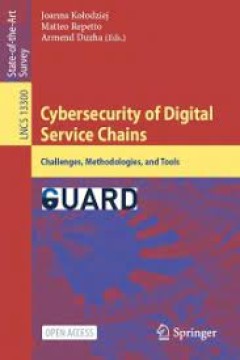Filter by

Weaving the dark web :legitimacy on freenet, Tor, and I2P
An exploration of the Dark Web--websites accessible only with special routing software--that examines the history of three anonymizing networks, Freenet, Tor, and I2P.OCLC-licensed vendor bibliographic record.
- Edition
- -
- ISBN/ISSN
- 9780262347587
- Collation
- 1 online resource (xi, 276 pages).
- Series Title
- -
- Call Number
- -

The virtual community :homesteading on the electronic frontier
Howard Rheingold tours the "virtual community" of online networking. Howard Rheingold has been called the First Citizen of the Internet. In this book he tours the "virtual community" of online networking. He describes a community that is as real and as much a mixed bag as any physical community -- one where people talk, argue, seek information, organize politically, fall in love, and dupe other…
- Edition
- Revised edition.
- ISBN/ISSN
- 026229141X
- Collation
- 1 online resource (480 pages).
- Series Title
- -
- Call Number
- -

Beyond our control? :confronting the limits of our legal system in the age of…
This book provides a framework for thinking about the law and cyberspace, examining the extent to which the Internet is currently under control and the extent to which it can or should be controlled. It focuses in part on the proliferation of MP3 file sharing, a practice made possible by the development of a file format that enables users to store large audio files with near-CD sound quality on…
- Edition
- -
- ISBN/ISSN
- 9780262255738
- Collation
- 1 online resource (xiv, 452 pages)
- Series Title
- -
- Call Number
- -

E-topia :"urban life, Jim--but not as we know it"
"The global digital network is not just a delivery system for email, Web pages, and digital television. It is a whole new form of urban infrastructure - one that will change the forms of our cities as dramatically as railroads, highways, electric power supply, and telephone networks did in the past. In this book, William J. Mitchell examines this new infrastructure and its implications for our …
- Edition
- -
- ISBN/ISSN
- 0585108978
- Collation
- 1 online resource (184 pages)
- Series Title
- -
- Call Number
- -

Me++ :the cyborg self and the networked city
"With Me++ the author of City of Bits and e-topia completes an informal trilogy examining the ramifications of information technology in everyday life. William Mitchell describes the transformation of wireless technology in the hundred years since Marconi: the scaling up of networks and the scaling down of the apparatus for transmission and reception. He examines the effects of wireless linkage…
- Edition
- -
- ISBN/ISSN
- 9780262280020
- Collation
- 1 online resource (259 pages)
- Series Title
- -
- Call Number
- -

PVM--parallel virtual machine :a users' guide and tutorial for networked para…
Written by the team that developed the software, this tutorial is the definitive resource for scientists, engineers, and other computer users who want to use PVM to increase the flexibility and power of their high-performance computing resources.Written by the team that developed the software, this tutorial is the definitive resource for scientists, engineers, and other computer users who want …
- Edition
- -
- ISBN/ISSN
- 0585309604
- Collation
- 1 online resource (xvii, 279 pages) :illustrations.
- Series Title
- -
- Call Number
- -

Protocol :how control exists after decentralization
How Control Exists after DecentralizationIs the Internet a vast arena of unrestricted communication and freely exchanged information or a regulated, highly structured virtual bureaucracy? In Protocol, Alexander Galloway argues that the founding principle of the Net is control, not freedom, and that the controlling power lies in the technical protocols that make network connections (and disconne…
- Edition
- -
- ISBN/ISSN
- 9780262273428
- Collation
- 1 online resource (xxvi, 260 pages) :illustrations.
- Series Title
- -
- Call Number
- -

Rethinking public key infrastructures and digital certificates :building in p…
Title from title screen.Includes index.Stefan Brands proposes cryptographic building blocks for the design of digital certificates that preserve privacy without sacrificing security.As paper-based communication and transaction mechanisms are replaced by automated ones, traditional forms of security such as photographs and handwritten signatures are becoming outdated. Most security experts belie…
- Edition
- -
- ISBN/ISSN
- 9780262269131
- Collation
- 1 online resource (xxi, 314 pages)
- Series Title
- -
- Call Number
- -

Shaping the network society :the new role of civil society in cyberspace
"An outgrowth of the Seventh DIAC symposium held in Seattle in 2000"--Introduction.Information and computer technologies are used every day by real people with real needs. The authors contributing to Shaping the Network Society describe how technology can be used effectively by communities, activists, and citizens to meet society's challenges. In their vision, computer professionals are concern…
- Edition
- -
- ISBN/ISSN
- 9780262283250
- Collation
- 1 online resource (x, 433 pages) :maps
- Series Title
- -
- Call Number
- -

Cybersecurity of Digital Service Chains Challenges, Methodologies, and Tools
This open access book presents the main scientific results from the H2020 GUARD project. The GUARD project aims at filling the current technological gap between software management paradigms and cybersecurity models, the latter still lacking orchestration and agility to effectively address the dynamicity of the former. This book provides a comprehensive review of the main concepts, architecture…
- Edition
- -
- ISBN/ISSN
- 9783031040368
- Collation
- -
- Series Title
- -
- Call Number
- -
 Computer Science, Information & General Works
Computer Science, Information & General Works  Philosophy & Psychology
Philosophy & Psychology  Religion
Religion  Social Sciences
Social Sciences  Language
Language  Pure Science
Pure Science  Applied Sciences
Applied Sciences  Art & Recreation
Art & Recreation  Literature
Literature  History & Geography
History & Geography